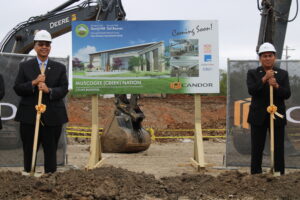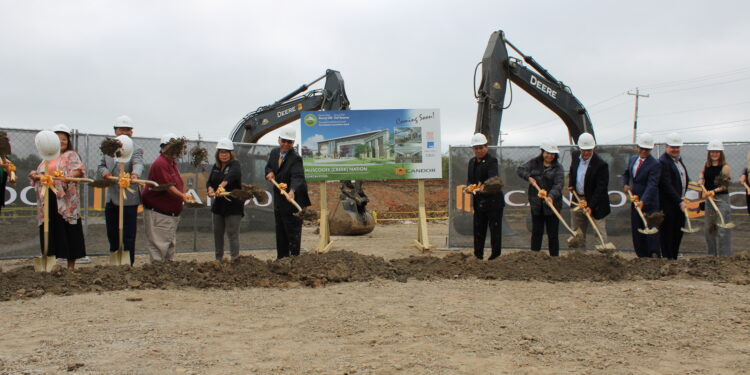“We’re here to grow. To make this Nation prosper. We’re going to continue to do that, especially to fight for our sovereignty.” – Chief David Hill
OKMULGEE – On Wednesday, Oct. 8 MCN Tribal leadership officially broke ground on the new Tribal Courthouse on the MCN Tribal Complex. The groundbreaking took place at the courthouse’s new address at 1103 East Eufaula. The 43,514 square-foot structure will sit on the southeast corner of the complex where the Mvskoke Media building was previously located. The groundbreaking comes five years after the McGirt Decision affirmed that the MCN has jurisdictional authority to prosecute Tribal citizens who commit crimes on the MCN Reservation. The project was designed by New Fire Native Design Group and will be constructed by Candor Building Solutions.
Native New Fire Design Group President Jason Holaby (Mvskoke) said that the Executive Branch was very closely involved with the vision and planning of the Tribal courthouse. It will house both the MCN Supreme Court and District Court. The first floor will feature an expanded waiting area and two jury courtrooms that can hold up to 150 spectators each. Other spaces include attorney-client rooms, settlement conference rooms, hearing rooms as well as expanded office space for court clerks and judges.
The MCN Supreme Court will be found on the second floor with a ceremonial courtroom, waiting spaces, and seating for 150 spectators. The Supreme Court will also be outfitted with their own expanded office space, conference rooms and hearing rooms. Holaby said the expansions will more adequately serve the needs of the Tribe now that the volume of cases filed within the justice system has grown significantly since the McGirt Decision.
The courthouse’s exterior will feature a large outdoor public seating area with a statue at the center that symbolizes the fires of the Ceremonial Grounds. According to New Fire Native’s website, the fire motif was selected to be reminiscent of areas where council members met and deliberated on unifying decisions. Fire and other Mvskoke cultural motifs will be seen throughout the campus.

Groundbreaking Remarks
MCN Press Secretary Jason Salsman remarked that this ceremony is a huge achievement for the Tribe and its fight for sovereignty. According to Salsman, this project is a result of many years of patience and diligent hard work from those working in the MCN judicial system.
“Such a big part of progress and prosperity is building this infrastructure, meeting our jurisdictional responsibilities and our needs in 2025 and beyond,” Salsman said. “How many know today that this is what our ancestors really saw for us at one point? They knew that we would grow, they knew that this day would come. They always believed and we had to see it through. A lot of people in our justice system worked very, very hard to make this dream possible.”
MCN Principal Chief Hill believes the court house is a step in the right direction for a justice system that has faced internal and external challenges since the McGirt Decision. In Chief Hill’s words, despite opposition from other law enforcement agencies located within the jurisdictional boundaries of the MCN Reservation, the MCN will continue to serve justice to Tribal citizens.
“There are certain individuals who say we don’t have a court system, it’s not working. We’re here to prove them wrong and we have been. I can’t say enough about our court system. We’re going to continue to do the best that we can with the support of the Executive Branch and the Legislative Branch. We appreciate it, it’s a lot of hard work.”
MCN Second Chief Del Beavor echoed Chief Hill’s sentiments that the project will provide much more than just adding a new structure to the complex.
“This is not just a building. Think about what this building represents. From the time we got here from the time today, this represents the true sovereignty of the Nation,” Chief Beaver said. “This building is going to house how we do justice on the reservation, it’s going to house how we justify things on the reservation. This is about public safety. This is about justice. This is about those who break the law get punished. Those who are victims get restitution. This is not just a building.”
MCN Supreme Court Justice Leah Harjo-Ware delivered a speech at the groundbreaking on the history of the Tribe’s sovereignty and its justice system. Harjo-Ward discussed how the reservation was established in the Treaty of 1832, was reinforced in the Treaty of 1866 after the Civil War, and was most recently affirmed in the McGirt Case of 2020. She further emphasized that the reservation has endured a lot over its 193-year existence: the allotment era, the Curtis Act and the Dawes Rolls which were all acts designed to decentralize MCN and the Five Tribes’ judicial systems. Harjo-Ware noted that the Tribe’s court system would not be fully recognized as a legitimate judicial system until after the passage of the Indian Child Welfare Act of 1978 and signing of the 1979 MCN Constitution.
“It’s been a long road. Today marks the day when we are rebuilding our court system with actual brick and mortar,” Justice Harjo-Ware said. “Bricks and mortar we had in the 1800s was sold against our will. We don’t have those anymore but today marks a new day. It marks a day in which we rebuild what was taken away from us. I am so glad that the National Council has appropriated funds and the Principal Chief has kept his word. We are going to have a new courthouse.”

This is not the first project Holaby has constructed for the Nation. However, in his own words, it is perhaps the most important in regards to its purpose serving Tribal citizens.
“We’re here to celebrate more progress. But this one’s a little bit different, perhaps even more significant because we’re here to break ground on a new building that exemplifies our unwavering commitment to the continued assertion of our Tribal sovereignty,” Holaby said.
“Even as we faced continued attempts to undermine that from the state and local level. Sovereignty is not merely a privilege granted by the federal government. It’s an inherent right that predates the formation of the United States. We are in control of the administration of justice for our own people.”





